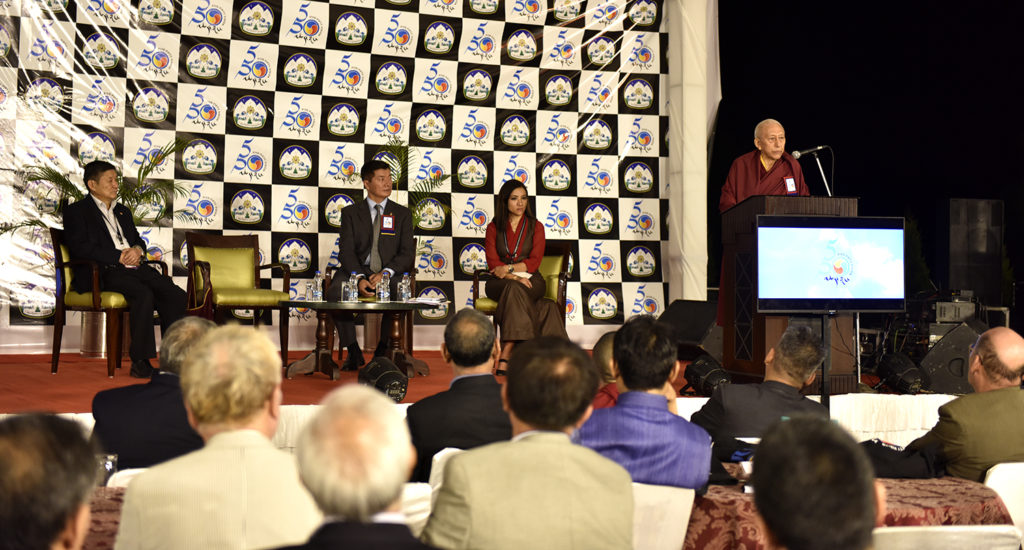Gudiance Talk by His Eminence Prof. Samdhong Rinpoche at the Five-Fifty Forum
At 7 pm, on 5 October 2017, at a welcome dinner for the participants of Five-Fifty Forum organised, at Hotel Pavilion, Dharamshala, by Department of Information and International Relations, Central Tibetan Administration, His Eminence Prof. Samdhong Rinpoche gave a guidance talk on the present dire situation inside Tibet, perspectives on the aspects of future Tibetan struggle, the need to look from many angles at Tibet’s situation, that it can be commented upon through many ways.
His Eminence Rinpoche further pointed out: To really understand Tibet issue one needs to know well Tibet’s spirituality, culture, the present situation of Tibet, and the situation of Tibetans. For a positive change of the Tibetan situation in future, it would not come naturally, we need to put efforts.
Describing the present Tibetan political situation as of three phases, His Eminence Rinpoche explained that the contemporary Tibetan political situation can be looked at as of three phases: Five-Fifty of 20th century, Six-Sixty of 21st century, and Five-Fifty of now onwards of the future. His Eminence Rinpoche elaborated: Five-Fifty of 20th century—between 1904 till 1954—was the time of the gravest political blunders; during the first five years of that period Tibet became subjected to a trade treaty along with Britain and China, British trade mission launched a military aggression on Tibet.
Thereafter, during the subsequent fifty years the communist China annexed Tibet, it was also a time Tibet had a very good prospect of gaining recognition from the world at large as a fully independent nation. During this period, not only India had gained independence from the British colonial rule, the then new government of India had determined about recognising Tibet as an independent nation and to establish a bilateral relation, but since the Tibetan political leaders of the time did not have any understanding of world at large, that opportunity slipped away. At that time if we had understood world situation, Tibet would have stayed as a fully independent nation. At that time the Indian government contacted the Tibetan government, with the thoughts that the trade relations from the British times would be maintained, but the Tibetan leaders did not even give a response. The Indian government was left with no choice but to establish a direct relation with China.
In describing Six-Sixty of 21st century, His Eminence Rinpoche explained: If this phase is set as from 1957 till 2017, during the first five years of this phase Tibetans endured much hardship. Yet, around late 1960’s, due to having been able to revive Tibet’s spirituality and culture, the situation improved. During this phase His Holiness the Dalai Lama had to leave into exile, followed by many thousands of Tibetans. Nevertheless, during this time a new interest began to be shown by world at large towards His Holiness, resulting in many political heads of countries around the world supporting the Tibetan cause. Being in exile, we Tibetans have been able to preserve and revive our spirituality and culture. Through the greatly far-reaching three commitments of His Holiness the Dalai Lama people around the world revere His Holiness, who works tirelessly all the time in globally promoting lovingkindness and compassion, and through such splendour and compassionate guidance of His Holiness the Dalai Lama the future direction for Tibetans have been made firmly established and enduring.
Continuing on, His Eminence Rinpoche remarked: That His Holiness the Dalai Lama has led the Tibetans on the path of non-violence and democracy has galvanised strong international support for Tibet; long into future too, if required, we Tibetans should not err by straying from such a method of our struggle.
Expressing concern of a time in future if His Holiness were no more alive, His Eminence Rinpoche advised: As His Holiness the Dalai Lama has very kindly assured the Tibetans that His Holiness would live for a long time, it is certain that His Holiness will kindly live for a long time, nevertheless if there comes a time when His Holiness is no more, it could be a time of darkness for Tibetans. At that time the democratic administration, which His Holiness the Dalai Lama has bestowed upon Tibetans, will have to politically lead Tibetans.
Touching upon the urgent matter of the Chinese government policy on Tibetan language, His Eminence Rinpoche said: The present communist Chinese government is implementing a destructive policy of deliberately making extinct the Tibetan language. We all should certainly work hard towards reviving our language, and preserving it; in particular, the Tibetans living in free countries should put all efforts towards that.
In conclusion His Eminence Rinpoche extended Best Wishes to all participants, and told them that they should discuss actively, with best of their intellect, for the forthcoming three days of conference, and that the opinions raised would be of benefit for the future generations of Tibetans.
